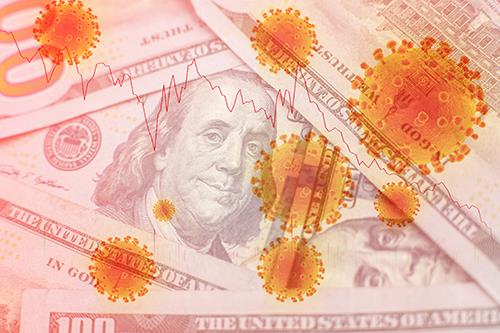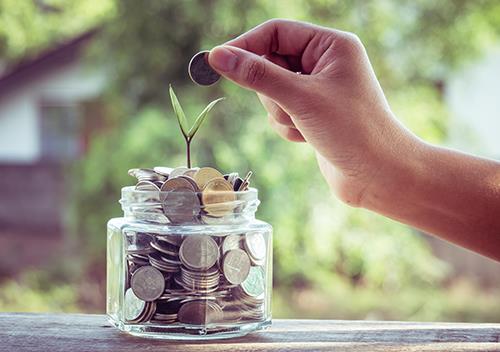 Holly Johnson
Holly Johnson
March 31, 2020
• 5 Minute Read
As the new decade approached and the year 2020 became a reality, the U.S. economy was in excellent shape by most measures. The unemployment rate was only 3.6 percent in January of 2020 according to the Bureau of Labor Statistics (BLS), and the Dow Jones Industrial Average reached a market high on February 14, 2020. For the most part, all was well with the world.
But in the shadows, a new storm was brewing for America and our economy. Coronavirus, which causes COVID-19, soon threatened to shut down our businesses and our lives for weeks and months to come. All of a sudden, our economy went from a period of rapid growth into a barrel roll toward a recession in a matter of weeks.
What Is a Recession Anyway?
You hear this word “recession” thrown around all the time, but what does it really mean? According to the U.S. Bureau of Economic Policy (BEA), the word recession connotes “a marked slippage in economic activity.”
The BEA also says that, while gross domestic product (GDP) is the broadest measure of economic activity, “the often-cited identification of a recession with two consecutive quarters of negative GDP growth is not an official designation.”
Not only that, but a real “recession” isn’t just a quick drop that barely puts a blip on our radar. A recession involves a considerably long stretch of time filled with bad news that will likely have prolonged consequences.

What happens during a recession, exactly? The results of negative GDP growth can vary, but they usually include:
- An increase in unemployment
- The stock market loses value
- People struggle to get ahead
There are other downsides of a recession, too. For example, multiple studies have shown that market downturns and recession-like conditions lead to mental health problems. A study titled “Hardship during the Great Recession linked with lasting mental health declines” from the Association for Psychological Science , summarized this overall trend and their research on the Great Recession by saying, “people who suffered a financial, housing-related, or job-related hardship as a result of the Great Recession were more likely to show increases in symptoms of depression, anxiety, and problematic drug use, research shows.”
How Do You Prepare for a Recession?
While nobody knows when a true recession will take hold, there are some steps you can take to protect yourself in the event the economy begins to shrink. Fortunately, the steps you take to prepare for a recession are positive money moves that can benefit you either way.
If you’re worried about the future and hoping to protect your family from dire financial consequences, here are some steps you can take now.
Build an Emergency Fund
Most experts suggest keeping 3 to 6 months of expenses in a dedicated savings account for emergencies even when the economy is going fine, but having an e-fund during a market downturn is absolutely crucial. In the event you lose your job or face a loss in income, you’ll need to rely on your savings to keep up with living expenses and bills until the situation improves. Without any money set aside, it might be difficult to keep the lights on and food on the table, much less pay your mortgage and auto loan each month.

If you haven’t already, you should open a high-yield savings account and begin stashing away as much money as you can. If you wind up a position where you lose your job or have your hours cut, you’ll be glad you planned ahead.
Look for Alternative Sources of Income
Also make sure to keep your mind open in terms of alternate sources of income. If you have a side hustle or professional talent that might help you bring in money during a market downturn, now may be an excellent time to expand your network or sharpen your skills.
If you are able to start earning extra money now that you could save for a rainy day, that’s even better.
Avoid New Debt
Another way to protect yourself from the negative consequences of a recession is to avoid new debt at all costs. When the future is financially uncertain, the last thing you should do is borrow more money or charge new purchases to a credit card. If anything, you should strive to only spend cash that you already have, and to avoid using plastic for purchases you can’t pay off.
Another step that can help you during a recession is paying off debt, at least if you are financially able. If you can pay down high interest credit card debt or other unsecured debts now while times are still good, you’ll have fewer liabilities and worries if you face a loss in income later on.
If most of your debts are at high interest rates that make paying them off quickly a problem, you can also look into debt consolidation, which might let you lump all your debts into a new loan with a lower APR.
Reduce Your Fixed Expenses
Also look for ways to lower your monthly expenses, or at least for expenses you could cut if you had to. On top of the “big expenses” you have each month for lodging and transportation, make sure you have a general idea of how much you’re spending on food and entertainment, as well as whether you have subscriptions or unnecessary expenses you could easily cut.
If you do face a job loss or a loss in income, you’ll want to spend as little as possible until your situation turns around. That’s a lot easier when you’re already keeping your expenses at a minimum, or when you have a list of cuts you could make if you had to.
Plan an Investing Strategy
Finally, make sure you have a plan in place when it comes to your retirement and investing strategy. Financial experts seem to agree that you shouldn’t make drastic investing decisions when the market declines and that, most of the time, staying the course is the best option.
Most people should also continue regular contributions to retirement accounts during a market downturn if they’re financially able. Not only will this help you stay on track with your retirement goals, but you’ll be able to build wealth faster once the economy rebounds since you’re buying stocks on sale.
Either way, make sure you have a plan for your retirement. That plan should probably involve doing nothing and staying the course, but you’re less likely to panic if you know this ahead of time.
Editorial Disclaimer: Information in these articles is brought to you by CreditSoup. Banks, issuers, and credit card companies mentioned in the articles do not endorse or guarantee, and are not responsible for, the contents of the articles. The information is accurate to the best of our knowledge when posted; however, all credit card information is presented without warranty. Please check the issuer’s website for the most current information.